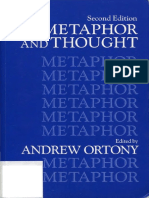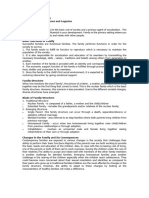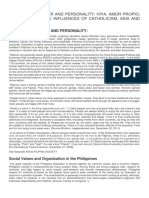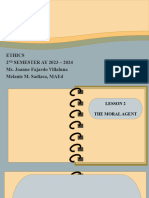0 ratings0% found this document useful (0 votes)
57 viewsDeterioration of Close Family Ties A Unique Filipino Trait
Deterioration of Close Family Ties A Unique Filipino Trait
Uploaded by
Princess Diane VicenteThe document discusses the deterioration of close family ties among Filipino families. It provides background on the traditional Filipino value of close family ties, with extended family members living together. However, it notes this value seems to be deteriorating over time. The study aims to understand millennials' perspectives on the positive and negative effects of close family ties. It reviews literature citing causes of deterioration like families being less financially and socially supportive of each other. The methodology examines millennials' ratings of statements about close family ties' impacts.
Copyright:
© All Rights Reserved
Available Formats
Download as DOCX, PDF, TXT or read online from Scribd
Deterioration of Close Family Ties A Unique Filipino Trait
Deterioration of Close Family Ties A Unique Filipino Trait
Uploaded by
Princess Diane Vicente0 ratings0% found this document useful (0 votes)
57 views8 pagesThe document discusses the deterioration of close family ties among Filipino families. It provides background on the traditional Filipino value of close family ties, with extended family members living together. However, it notes this value seems to be deteriorating over time. The study aims to understand millennials' perspectives on the positive and negative effects of close family ties. It reviews literature citing causes of deterioration like families being less financially and socially supportive of each other. The methodology examines millennials' ratings of statements about close family ties' impacts.
Original Description:
Social Science research about close family ties in the Philippines.
Original Title
Research Socsci
Copyright
© © All Rights Reserved
Available Formats
DOCX, PDF, TXT or read online from Scribd
Share this document
Did you find this document useful?
Is this content inappropriate?
The document discusses the deterioration of close family ties among Filipino families. It provides background on the traditional Filipino value of close family ties, with extended family members living together. However, it notes this value seems to be deteriorating over time. The study aims to understand millennials' perspectives on the positive and negative effects of close family ties. It reviews literature citing causes of deterioration like families being less financially and socially supportive of each other. The methodology examines millennials' ratings of statements about close family ties' impacts.
Copyright:
© All Rights Reserved
Available Formats
Download as DOCX, PDF, TXT or read online from Scribd
Download as docx, pdf, or txt
0 ratings0% found this document useful (0 votes)
57 views8 pagesDeterioration of Close Family Ties A Unique Filipino Trait
Deterioration of Close Family Ties A Unique Filipino Trait
Uploaded by
Princess Diane VicenteThe document discusses the deterioration of close family ties among Filipino families. It provides background on the traditional Filipino value of close family ties, with extended family members living together. However, it notes this value seems to be deteriorating over time. The study aims to understand millennials' perspectives on the positive and negative effects of close family ties. It reviews literature citing causes of deterioration like families being less financially and socially supportive of each other. The methodology examines millennials' ratings of statements about close family ties' impacts.
Copyright:
© All Rights Reserved
Available Formats
Download as DOCX, PDF, TXT or read online from Scribd
Download as docx, pdf, or txt
You are on page 1of 8
Deterioration of Close Family Ties
A Unique Filipino Trait
I. Introduction
A typical Filipino family is composed of the grandparents, the
mother, the father, and their children. One of the unique values
of a Filipino family that distinguishes it from all other
families of different nationalities is the value of close family
ties. It is a situation where the children continue to live with
their parents and grandparents even after being married. The
value reflects the Filipinos love and care for their families
and also reflects the closeness of the family as a simple unit
of the society. Living with one another strengthens the family’s
bond and indeed creates a strong relationship between the
members. The sense of trust and dependency between each member
of the family is the foundation of this value, wherein a family
member deeply depends his goals and aspirations from his family
and view his or her family as a source of strength and
inspiration. Those were the days when “family comes first” for
every Filipino family member, and when we say family, it is
composed of the spouses and their children, the grandparents
and other immediate family members. Over the years, this value
seems to deteriorate or fade out of the Filipino family picture.
Years or decades from now, as we approach towards a country with
full productivity, this value might be completely out of the
scene because of the idea of nuclear family. Nuclear family is
composed of the parents and their children, contrary to our old
practice of the extended family. The modern families of today
tends to isolate themselves from other immediate members of
their family (e.g. grandparents) so the closeness and the bond
between the nuclear family members and their relatives (not
within the nuclear family) is not strong enough unlike when
close family ties is being practiced.
A. Objectives of the Study
As the generation became more and more influenced by cultures
from different nationalities, the practice of close family ties
among Filipino families slowly declines as shown in previous
studies. This study intended to know whether there really is a
deterioration and to dig or see through the possible cause of
such decline of the practice. This study will focus on the
insights of the millennials about the idea of close family ties,
for they are the one who will pass it out to future generations.
It will focus also on the positive and negative effects of close
family ties.
B. Review of Related Literature and Studies
According to an article by Sania Siddiqui published in dawn.com,
“With times changing, parents are becoming more and more
occupied, failing to keep the family unit financially strong
and socially uplifted, and children are often left to fend for
themselves. Weakening of family ties results in the patriarch
losing his/her position of pre-eminence in the family. The
family becomes a group of disparate individuals without an
opportunity to imbibe traditional, social norms and mores.
Children today are left to be taken care of by institutions
alone, where they tend to grow self-centered and egocentric.’’.
This article sights a possible cause of deterioration or decline
in the practice of close family ties among Filipino families
that results to children being independent and having them be
adopted by the society when it is their family that is
responsible for their growth and development.
According to a blog posted in wordpress.com by aadenish09
(August 31, 2011), “Close family ties among Filipinos are
considered a boon to society because they bring about the spirit
of sama-sama, salo-salo, tayo-tayo at bayanihan. Because of
close family ties, relatives are able to help each other on
moral, physical, financial and spiritual needs. Relatives also
help out needy ones to start a small business by being a
guarantor or extending a personal loan. Filipinos also seek the
help, mostly monetary, of relatives during emergencies. A
relative is always there to smooth life’s complexities. The act
of helping others is not just common among kin, fictive kin,
but especially between friends. Filipino families indeed extend
their charity and generosity beyond their family. Oppositely,
close family ties create dependency. It creates a feeling of
dependency that makes some unproductive. All over, adults still
dependent on their parents.”. Some members abuse kindness.
According to Dennis Acop, an Overseas Filipino Worker, “We give
them our hand, they want the best we have and won’t stop asking
until nothing is left to us. Out of 9 kindnesses you bestowed
to them, with 1 mistake or failure to extend our help, they
will burst their anger and call us selfish and proud, forgotten
those times we have helped them and fed them. Makes us feel
that they own everything we have coz’ they are members of the
family.” The blog post talks about the negative effects of close
family ties and how it negatively affects the well-being of a
family member and how it became a way for some member to abuse
the generosity and kindness of the other.
II. Methodology
A. Theoretical Framework
Millennial's Opinion
about the Negative
and Positive effects
of Close Family Ties
among Filipino
families
Deterioration
of Close
Family Ties
The theoretical framework shows the independent variable
that will be addressed by the research and how it affects
the issue of the deterioration of close family ties.
B. Types of Data
The dependent variable in the research is the issue of the
deterioration of close family ties among Filipino families
and the dependent variable is the millennials’ opinion and
insights about the issue.
C. Techniques of Gathering Data
The researchers will gather the data needed by handing
forms to the respondents that includes statements
containing positive and negative effects of practicing
close family ties.
D. Choice of Sample
There will be 50 respondents, composed of random students
belonging to the millennial generation. The sample is
chosen based on their direct connection to the issue. The
chosen respondents are millennials because they are the
ones responsible to preserve our values and traits.
Millennial’s insights reflect how they wanted the near
future to be, their ideas will be the future of our nation.
III. Data Gathering
The respondents will give weight to each statements, five (5)
being the highest weight and one (1) being the lowest, and
the sum of the statements’ weight will then be totaled to
analyze the resulting data as to which statements best
reflects the current standing of the issue and which
statements are least likely to do so.
IV. Data Analysis
Positive Statements Negative Statements
Rank Description Rank Description
1 It is a good trait. 1 It is inconvenient.
2 It helps a member be 2 It is impractical.
more confident.
3 It makes us more of a 3 It is burdensome
Filipino. because some family
members are abusive of
the shared resources.
4 It makes us unique. 4 It does not help in
motivating members to
do better because some
members are toxic.
5 It strengthens the bond 5 It is a root of
between family members. conflict within the
family.
6 It gives a sense of 6 It is a menace to
security to the society because it has
members. many disadvantages.
7 It leads to a happier 7 It is toxic because
family relationship. problems of one
members affect all
other members.
8 It is part of our 8 It is a source of shame
culture and we should because a bad attitude
preserve it. of a member reflects
all other members.
9 It helps in building a 9 It should not be
person’s well-being. practiced anymore
because we need to live
practically.
10 It motivates a person 10 It makes us less of a
in achieving his or her Filipino.
dreams.
According to the data table above, the major factors that
contributes to the deterioration of close family ties is that: it
is inconvenient, impractical, it is burdensome, it is de-
motivating, and it is a root of conflict between family members.
On the other hand, the major factors that contributes to the trait
being continually practiced by some are: it is a good trait, it
helps a member be more confident, it makes a member be more of a
Filipino, it makes us unique, and it strengthens the bond between
family members.
You might also like
- A.ortony - Metaphor and ThoughtDocument350 pagesA.ortony - Metaphor and ThoughtAnonymous uD8YEGV100% (2)
- DECS ORDER 107 s1989 - Standards in PreschoolDocument13 pagesDECS ORDER 107 s1989 - Standards in PreschoolBrenda Nicolas100% (4)
- The Filipino FamilyDocument4 pagesThe Filipino FamilyCharlesMarcPedidaCapilitanNo ratings yet
- Developing Family LeadershipDocument30 pagesDeveloping Family LeadershipThe Centre for Welfare ReformNo ratings yet
- The Strength and Weaknesses of Filipino Character: A Socio-Cultural Issues and Global Issue That Concern Schools and SocietyDocument21 pagesThe Strength and Weaknesses of Filipino Character: A Socio-Cultural Issues and Global Issue That Concern Schools and SocietyRey Mark LigsaNo ratings yet
- Arboleda, Jaira A. Mr. Manny Sunga CAS05-501E EthicsDocument2 pagesArboleda, Jaira A. Mr. Manny Sunga CAS05-501E EthicsJAIRA ARBOLEDANo ratings yet
- Perdev Lesson 9 Family RelationshipsDocument15 pagesPerdev Lesson 9 Family Relationshipsgeronimomj159No ratings yet
- Family Dynamics Second DayDocument56 pagesFamily Dynamics Second DaySr Chato BalancinNo ratings yet
- Act 6 NSTPDocument4 pagesAct 6 NSTPMariane MarianoNo ratings yet
- PERDEVQ4MOD6LESSON262NDSEMDocument13 pagesPERDEVQ4MOD6LESSON262NDSEMJolina Imbuido ValdezNo ratings yet
- CA 2 Test 4-6Document5 pagesCA 2 Test 4-6Zhyraine Iraj D. CaluzaNo ratings yet
- A Moral Recovery ProgramDocument2 pagesA Moral Recovery ProgramConrado Dominic Ordinario Ruiz100% (13)
- Learning Activity Filipino ValuesDocument1 pageLearning Activity Filipino ValuesAllen Kurt RamosNo ratings yet
- WEEK 16 Filipino Culture Practices and Beliefs 118 LecDocument6 pagesWEEK 16 Filipino Culture Practices and Beliefs 118 LecAlthea AlcalaNo ratings yet
- Family Systems in IndiaDocument11 pagesFamily Systems in IndiaAbhi SharmaNo ratings yet
- NSTP 2 Final PaperDocument6 pagesNSTP 2 Final PaperFritz Darryl DiazNo ratings yet
- $RXND34UDocument19 pages$RXND34URyan BastiampillaiNo ratings yet
- ThesisDocument17 pagesThesisArrabella Jane Ocampo Ortuoste100% (1)
- Module 7: Social Organization (Reflection)Document6 pagesModule 7: Social Organization (Reflection)Ace DotaNo ratings yet
- Preliminary Examination in Understanding The SelfDocument3 pagesPreliminary Examination in Understanding The SelfRachel Mae FajardoNo ratings yet
- Strength of Filipino Character Gerlie 20231205 221120 0000Document53 pagesStrength of Filipino Character Gerlie 20231205 221120 0000kurtrusselvallesterosNo ratings yet
- Ethics Report Filipino WaysDocument22 pagesEthics Report Filipino WaysFrank AbagnaleNo ratings yet
- MODULE 3-Filipino CharacteristicDocument11 pagesMODULE 3-Filipino CharacteristicKate Stephanie SimbajonNo ratings yet
- Group Task Module 2 Lesson 1Document4 pagesGroup Task Module 2 Lesson 1Her Shey Capilitan PongautanNo ratings yet
- Chapter 1Document8 pagesChapter 1AnneJunioVillanuevaNo ratings yet
- Marriage and Family Relationships (Module 2)Document9 pagesMarriage and Family Relationships (Module 2)Mark Anthony Nieva Rafallo100% (1)
- Activity in EthicsDocument6 pagesActivity in EthicsaquinomarcelacayabyabNo ratings yet
- Personal DevelopmentDocument2 pagesPersonal Developmenternestcabotajeturning21No ratings yet
- Perdev DLL Unit 2 - m9-11 HandoutsDocument2 pagesPerdev DLL Unit 2 - m9-11 HandoutsLEONILA MIRANDANo ratings yet
- Filipino Values and Moral Development Strengths and Weaknesses of The Filipino CharacterDocument89 pagesFilipino Values and Moral Development Strengths and Weaknesses of The Filipino CharacterEechram Chang Alolod100% (1)
- Signed Off - Personality Developent11 - q2 - m6 - Family Structures and Legacies - v3 - 2 PDFDocument20 pagesSigned Off - Personality Developent11 - q2 - m6 - Family Structures and Legacies - v3 - 2 PDFRaniel John Avila Sampiano50% (4)
- Lesson 3: Maintaining Desirable Family Values and Harmonious RelationshipDocument5 pagesLesson 3: Maintaining Desirable Family Values and Harmonious RelationshipKitkatNo ratings yet
- Sociology Freework 2Document5 pagesSociology Freework 2Sona CeferliNo ratings yet
- Ethics Module Lesson5Document9 pagesEthics Module Lesson5Cristine Mae Pregunta100% (1)
- FamilyDocument4 pagesFamilyDelia BratzchNo ratings yet
- Part IV Gender and SocietyDocument7 pagesPart IV Gender and SocietyDoromalXD SorbitoNo ratings yet
- Family As A Social Institution: Jose Joseph 2137804 Department of Social Work, Christ University BangaloreDocument8 pagesFamily As A Social Institution: Jose Joseph 2137804 Department of Social Work, Christ University BangaloreJose JosephNo ratings yet
- 2ND-QUARTER-REVIEWERDocument41 pages2ND-QUARTER-REVIEWERj23786193No ratings yet
- 4A of Lesson PlanningDocument19 pages4A of Lesson PlanningJhong Floreta MontefalconNo ratings yet
- Als Module 1Document19 pagesAls Module 1Errol John RuizNo ratings yet
- Multicultural Education - Chapter 3 (BSIT)Document14 pagesMulticultural Education - Chapter 3 (BSIT)extrainfinixNo ratings yet
- Contemporary Family LifeDocument30 pagesContemporary Family LifeChristyNo ratings yet
- Filipino Values 2Document82 pagesFilipino Values 2mitchesanchez21No ratings yet
- Philosophy Comte Aquino Module 6Document18 pagesPhilosophy Comte Aquino Module 6Kenneth Aquino80% (5)
- Term 7Document23 pagesTerm 7Mark Angelou OritNo ratings yet
- Assessing the Advantages and Disadvantages of Filipino Extended Family OfficeDocument2 pagesAssessing the Advantages and Disadvantages of Filipino Extended Family OfficemaiacNo ratings yet
- Assignment BbsDocument5 pagesAssignment BbsnmasaNo ratings yet
- Impact of Family Structure On The Overall Development of Youth 482274225Document5 pagesImpact of Family Structure On The Overall Development of Youth 482274225Andra Anamaria NegriciNo ratings yet
- SHS Humss Ucsp Q2 WK5Document5 pagesSHS Humss Ucsp Q2 WK5Tagayong KimberlyNo ratings yet
- Camposalyannap (Module 2)Document4 pagesCamposalyannap (Module 2)Alyanna Clarisse Padilla CamposNo ratings yet
- HealthDocument18 pagesHealthApril Pearl CapiliNo ratings yet
- Lesson 7 - Foundation of The Principles of Business Ethics Part 3 PDFDocument7 pagesLesson 7 - Foundation of The Principles of Business Ethics Part 3 PDFAlfred LendioNo ratings yet
- Plan On How To Make Family Firmer and GentlerDocument34 pagesPlan On How To Make Family Firmer and GentlerFelyn DelaCruz - DalinoNo ratings yet
- Education Diploma Program: Postgraduate Institute of Humanities and Social Sciences (Pgihs)Document7 pagesEducation Diploma Program: Postgraduate Institute of Humanities and Social Sciences (Pgihs)PemarathanaHapathgamuwaNo ratings yet
- Personal Development: Department of EducationDocument6 pagesPersonal Development: Department of EducationCerelina MestiolaNo ratings yet
- Forms of MarriageDocument15 pagesForms of MarriageRebecca MahabirNo ratings yet
- #3 C-Handout Roles & Marriage & DivorceDocument14 pages#3 C-Handout Roles & Marriage & DivorceAthena CrooksNo ratings yet
- Lesson 2 The Moral AgentDocument23 pagesLesson 2 The Moral AgentJean TampelicNo ratings yet
- Relating To Marriage or The Relationship Between Husband and Wife. On The Other HandDocument3 pagesRelating To Marriage or The Relationship Between Husband and Wife. On The Other HandgequilloNo ratings yet
- The We Between Us: A Three Dimensional View and Approach Toward Evaluating Unification and Relating Potentials Between Couples, Business or NationsFrom EverandThe We Between Us: A Three Dimensional View and Approach Toward Evaluating Unification and Relating Potentials Between Couples, Business or NationsNo ratings yet
- Co-Dependency: The Ultimate Guide to Break Free from Co-Dependent BehaviorFrom EverandCo-Dependency: The Ultimate Guide to Break Free from Co-Dependent BehaviorNo ratings yet
- FL Spanish To FilipinoDocument2 pagesFL Spanish To FilipinoPrincess Diane VicenteNo ratings yet
- Tax - Special TopicsDocument28 pagesTax - Special TopicsPrincess Diane VicenteNo ratings yet
- Tax - Special TopicsDocument28 pagesTax - Special TopicsPrincess Diane VicenteNo ratings yet
- PARTNERSHIPDocument46 pagesPARTNERSHIPPrincess Diane Vicente0% (1)
- Del Monte Pacific LimitedDocument7 pagesDel Monte Pacific LimitedPrincess Diane VicenteNo ratings yet
- Chapter 1 Introduction To TaxationDocument70 pagesChapter 1 Introduction To TaxationPrincess Diane VicenteNo ratings yet
- LDR 531 Free Final ExamDocument10 pagesLDR 531 Free Final ExamRogue Phoenix50% (2)
- Lesson 1: Meaning and Functions of ManagementDocument3 pagesLesson 1: Meaning and Functions of ManagementJeffrey De BelenNo ratings yet
- Qualitative Research AssignmentDocument4 pagesQualitative Research AssignmentDinda Firly Amalia67% (3)
- Model Predictive Control Techniques For CSTR Using MatlabDocument9 pagesModel Predictive Control Techniques For CSTR Using MatlabJeeva MJNo ratings yet
- The Set-Up-To-Fail SyndromeDocument10 pagesThe Set-Up-To-Fail SyndromegollasrinivasNo ratings yet
- Dhinessh Kumar Poovaneswaran Viweganathan Kesavan: MC Clelland's Theory Motivation TheoryDocument14 pagesDhinessh Kumar Poovaneswaran Viweganathan Kesavan: MC Clelland's Theory Motivation TheoryMuthukumar AnanthanNo ratings yet
- 21st Century Skills+MetcogDocument6 pages21st Century Skills+MetcogHenny CRNo ratings yet
- Leadership Communication Using EQDocument32 pagesLeadership Communication Using EQHarry SidhuNo ratings yet
- Cuestionario Imagineria Motora NiñosDocument3 pagesCuestionario Imagineria Motora NiñosJoseNo ratings yet
- Monitoring Affective Trajectories During Complex LearningDocument6 pagesMonitoring Affective Trajectories During Complex LearningInês SousaNo ratings yet
- What Is SelfDocument27 pagesWhat Is SelfNoraisah Disomnong MalieNo ratings yet
- Brief History of PsychologyDocument3 pagesBrief History of PsychologyMaria TariqNo ratings yet
- Learning Skill: Dr. Jayalangkara Tanra SP - KJDocument21 pagesLearning Skill: Dr. Jayalangkara Tanra SP - KJFaris AzharNo ratings yet
- Challenges in Lean Implementation: Master ThesisDocument58 pagesChallenges in Lean Implementation: Master ThesisPrince Kelly100% (4)
- Perception and Personality in OrganisationsDocument27 pagesPerception and Personality in OrganisationsAces Salvador SocitoNo ratings yet
- Self-Compassion Mindfullnes PDFDocument2 pagesSelf-Compassion Mindfullnes PDFMiguel AlvarezNo ratings yet
- CH 16 (1-27-05)Document29 pagesCH 16 (1-27-05)David AlexanderNo ratings yet
- 3 Model For GiftedDocument5 pages3 Model For GiftedWanRezawanaWanDaudNo ratings yet
- Firstprinciplesinscrum SampleDocument22 pagesFirstprinciplesinscrum SampleSamanta Aragão JorgeNo ratings yet
- Carti Electronice (UBB Cluj) PDFDocument4 pagesCarti Electronice (UBB Cluj) PDFDenis IulianNo ratings yet
- Operationalization of Meme Selection Criteria: Methodologies To Empirically Test Memetic PredictionsDocument6 pagesOperationalization of Meme Selection Criteria: Methodologies To Empirically Test Memetic PredictionsChechoBautistaNo ratings yet
- MarCom PosDocument62 pagesMarCom Posanand sharmaNo ratings yet
- Iisc Short ListDocument42 pagesIisc Short ListGIRIRAJ SHARMANo ratings yet
- Schema TherapyDocument56 pagesSchema Therapypreciousrain0793% (14)
- Literature Review: Coaching Effectiveness - A Summary: Modernisation Agency Leadership CentreDocument23 pagesLiterature Review: Coaching Effectiveness - A Summary: Modernisation Agency Leadership CentreUyên Trương100% (1)
- Classical ConditioningDocument7 pagesClassical Conditioningenicarmen337698No ratings yet
- Good Intentions and Failed Implementations-DanismanDocument12 pagesGood Intentions and Failed Implementations-Danismanandreeutzavl24No ratings yet
- Shekhtman, Achieving Success in Second Language AcquisitionDocument13 pagesShekhtman, Achieving Success in Second Language AcquisitionwmiNo ratings yet






























































































